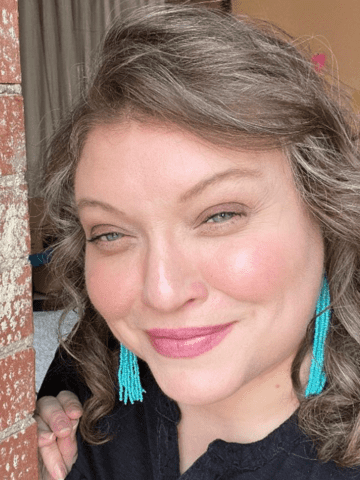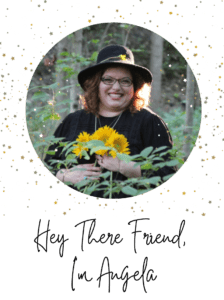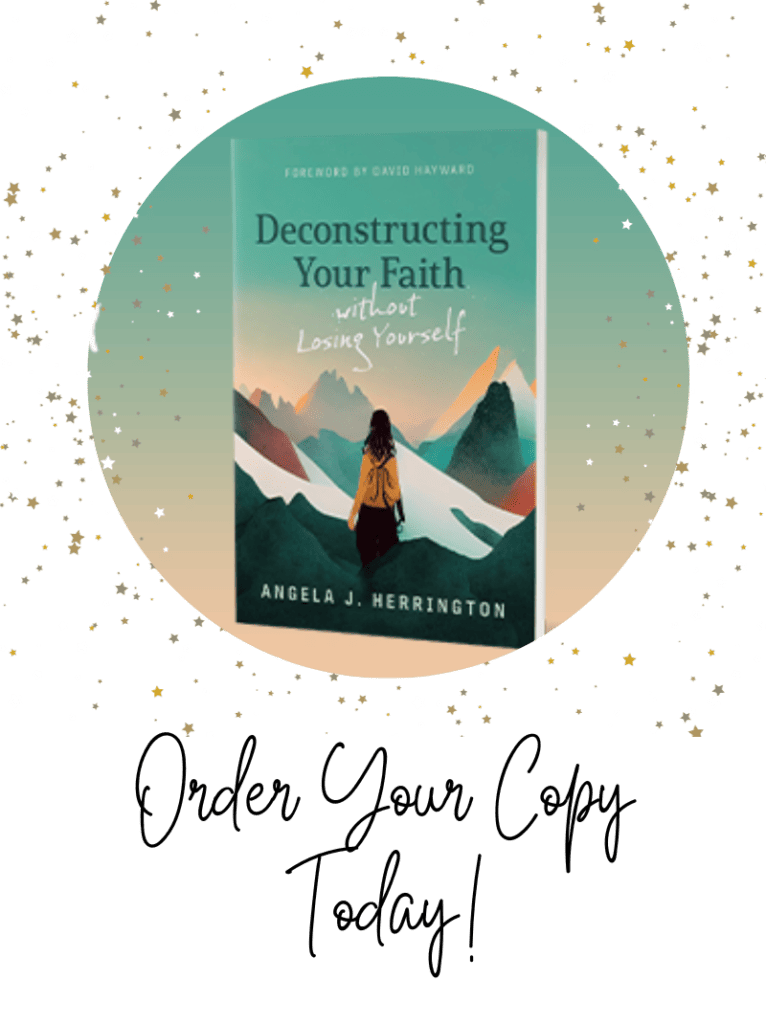When life gets chaotic…
Some seasons are challenging, while others are downright exhausting. Deconstructing toxic religious culture, healing from trauma, and reconciling hurt at the hands of the church can be very draining, but it’s so worthwhile. This time we’re in right now feels like a whole different level of chaos. There are battles that need to be fought in every season, but the heavy lifting of reclaiming your faith tends to take a heavy toll on us. So here are a few things you can do to care for yourself when life gets chaotic, particularly when deconstructing faith.
10 Ways to Care for Yourself When Life Gets Chaotic
1. Unplug.
Let your phone die for 24-48 hours per week. Stay off your laptop during that time. If you need to, have someone change your password on your devices. But get off of electronics for one to two days. During this time, notice not only how often you reach out for your devices, but how your body tends to shift and change throughout the day. When you check in with your body, ask:
How is my energy level?
Where is my anxiety?
How am I feeling overall?
Set an intention to take some of the goodness and peace you find when unplugged into the day-to-day. This is one amazing way to care for yourself when life gets chaotic.
2. Pay attention to your breathing.
I notice when I feel tense, I tend to hold my breath. Others I talk to tend to breathe shallowly. Shallow breathing and gasping for air sends your body into a stress spiral. It tells your body that it’s being threatened and that it’s not safe. Make it a priority to practice deep breathing and to check your breathing regularly throughout the day. Especially when you’re responding to a tense post, or answering an email that makes you feel threatened, or working on a deadline that you’re probably not going to make. Check your breathing during all of those times to make sure that your body is getting the most basic thing that it needs.
3. Get outside.
It’s important that we find space to be outside, whether it’s walking barefoot in your yard, tending your garden, or finding a park. There’s something that resets in us when we get outside. Get outside in the heat and the sun, and in the moonlight at night to look at the stars. If you’re in the city, see how different things look at night. Going outside helps you gain some perspective during challenging times. Even when your energy is low, I would encourage you to do this, because you can sometimes come back from these types of walks with more energy than what you started with.
4. Find some water.
On a similar note, moving water tends to be especially comforting. Find a creek, waterfall, canal, lake, or even a fountain to walk in. There’s something shocking to the system about being in water, and it can reset, ground, and calm you. If you have trouble with the breathing activity above, or if you have trouble calming and centering yourself, moving water is a great solution. It provides a calming visual and auditory stimulation, and there’s just something magical about being in the water.
5. Trigger good feelings with essential oils.
When the pressure’s on, and I can’t get outside, I tend to mix earthly, rooted scents with bright, energizing scents to help me find balance. An example of this would be patchouli (earthy, wet, woody) and mint, grapefruit, or bergamot (bright, citrus, sharp, energizing). This helps you replicate the sensory input you would normally get in a forest, garden, or park. The scents from essential oils can pull your memory back to a time when you were able to get out, explore, and connect to the earth.
6. Carve out a sacred space in your home that centers and recharges you.
If you have a large home, creating a personalized space can be easy. But if you live in apartments or travel in your RV, and this can be really challenging. However, it doesn’t have to be a tremendously large space. What you’re looking for is a small space that you can fill with things that nurture you. For example, in mine, I have a corner of a room with a shelf holding some plants, essential oils, some rocks I’ve collected on journeys, pictures of some grandmothers, and little tokens that probably don’t mean much to anyone else. They bring me joy and help me feel connected to my past. Candles are another great resources for this, as are inspirational quotes. Anything that sets up a sacred space to go into and reconnect with yourself is a loving way to care for yourself when life gets chaotic.
7. Feel what demands to be felt, then release it.
For many of us, our gut instinct is to stuff feelings down. But really it’s not a gut instinct, but instead it’s a skill that’s been taught to us. I want to challenge this practice in your life. Fight the urge or habit to tell yourself those emotions aren’t valid, to stuff them down, and save them for later. Because I promise there is a later, and it usually happens when you don’t want it to. It usually happens when you’re exhausted. So, when you feel angry, be angry. When you feel something sad or completely betrayed, feel those emotions. Then, sit in those emotions for a while, and release them. Work through them in the moment, feel them, learn from them, allow them to happen, and then release them so you can go back to whatever mental and emotional space you need to be in.
8. Distance yourself from non-essential conflict and expectations.
When you’re carrying big things (like breaking free from toxic religious culture), you don’t need people to add unimportant stuff to your load. If you have friends, family members, or colleagues who are really bad at drawing boundaries and are constantly asking you to carry more for them, this is probably not a good season for them to be in your life. Drawing boundaries in these areas is going to be really, REALLY important.
If there are people in your life or from your faith community who don’t understand why you are doubting, questioning, and wrestling with your faith, You may need to take a step back from those people and communities. If the thought of stepping back from your faith community creates internal tension for you, this article might be helpful: Sometimes You Have to Leave the Church to Find God..
The other thing you might have to do is step back from some roles. Remember, we said to distance yourself from conflict AND expectations? There are some things in your life that are really good, but they require effort and concentration. Like a volunteer job, or mentoring that you are doing. If you don’t have the bandwidth for it, now is the time to say, “I can’t do this anymore.” Maybe it will come back later, or maybe it won’t. Either way, step out of the expectation for this season so that it’s not pulling energy away from the battle you’re in the middle of. This intentional boundary setting is a kind way to show care for yourself when life gets chaotic.
9. Listen to your body.
This is one of those things I wish I had learned much sooner in life. Your body keeps score, and your body will tell you things if you listen to it. So spend some time each day checking in with your body and asking:
What aches?
Which parts of me need to move?
What needs to stretch?
What in my body wants to curl up into a ball?
And sometimes you’ll get insight into all of those things at once, and you’ll have to decide which to do first. But the important thing to know is when we don’t feel our emotions, when we don’t work through the pain, it sits somewhere in our body. If we pretend like it’s not there, we can’t release it. So listening to your body will tell you where you’re holding stress, or where those mean things someone said to you are resting in your body. It’s also going to tell you how you are physically holding stress with your posture. Your body will show you if you’re holding yourself in unnatural ways that are going to make you more susceptible to illness and injury. It’s really important to ask your body for insight, listen to your body, and respond appropriately to it.
10. Get out of this world, and get into the supernatural.
This last one is perhaps the most important, the one we should be practicing most often. If you are up to your eyeballs in conflict and these really hard fights, don’t miss what’s happening outside of human events. Get into prayer, meditation, spiritual healing sessions, and even into your dreams. In each of those spaces, you are able to take a little bit of a step back from the day-to-day and see the bigger picture. So make it a priority to stay connected to God. When the misogynistic voices of toxic religious culture scream loudly, sit in Jesus’ presence, and seek the movement of the Spirit because that is what’s going to help you see the context in which these battles are happening. That’s a safe space to rest. Sometimes that context is enough to keep you from losing yourself in the midst of the chaos.

Angela is a Faith Deconstruction Coach and host of The Deconstructing Faith Summit who helps people break free from toxic religious culture & empowers them to recover from #churchhurt. She has led online ministries for a decade, enjoys working with clients 1:1, in groups, and is a dynamic conference speaker. She’s a Lark’s Song Certified Life Coach who reaches thousands of people in 40+ countries each month on Facebook, IG, Twitter, Pinterest, and her blog.
She’s a firstborn, Enneagram 8, Gen Xer who loves to question everything. She holds a BA from Indiana Wesleyan and a Masters in Leadership from Wesley Seminary. Her graduate research project focused on leadership development and opportunities for Gen X women in the US church.
Angela and her unique online ministry are featured in Lyz Lenz’s 2019 book God Land: Story of Faith, Loss, and Renewal in Middle America. She has published articles in Hope for Women and HOPE is Now magazines. She has been featured in The New Republic, Publisher’s Today, and Religion News Service.
Her first book, Deconstructing Your Faith Without Losing Yourself, Will be published by Eerdmans in February 2023.
Angela is also a wife, mom to 5, and a proud resident of Marion, Indiana with her family when they’re not traveling the US in their RV.








